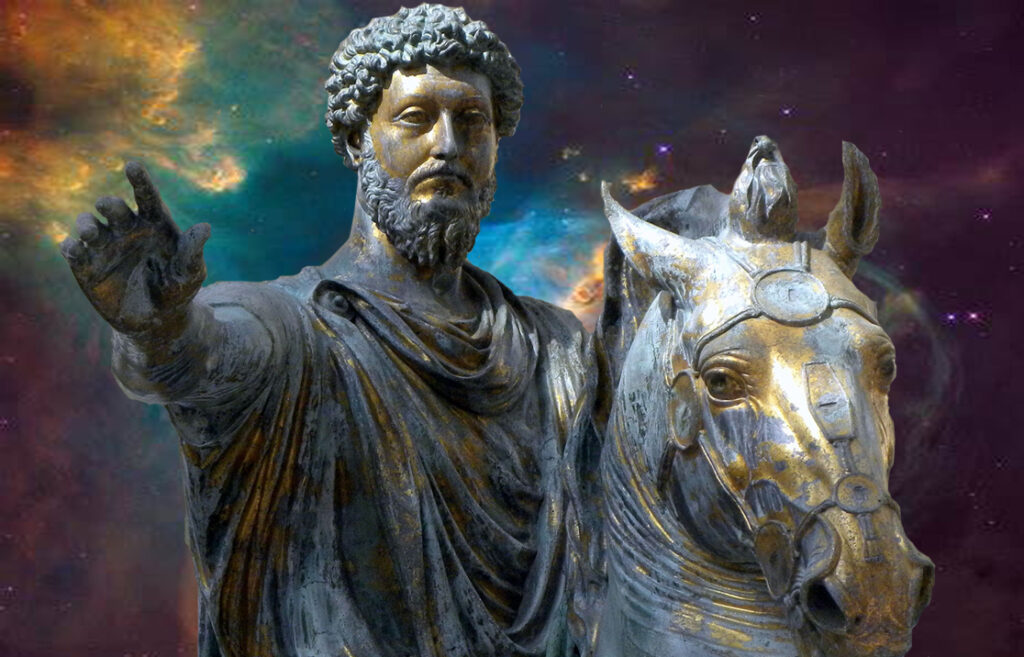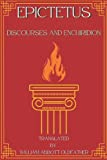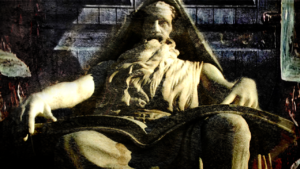Stoicism

The history, legacy, and relevance of the most Roman Greek Philosophy
It is the reign of Hadrian. The Pax Romana spreads its wings from the grey straits of the English Channel to the golden sands of Palmyra. Silks and spices flow into Egypt and from there reach Spain and Gaul. Two million square miles of settled land are the safest they have been in human history, and the safest they will be until almost two thousand years later. Like all safety, it is fleeting, but for the moment over 70 million people are free from the tribal or civil wars that defined the previous (and following) centuries. They are free from famine, and they are even free to continue most of their pre-Roman cultural customs. Merchants travel a Mediterranean sea where pirates are kept under the heel of a professional navy, and citizens freely travel newly built roads patrolled by professional soldiers. Millions of people inhabit colossal metropolitan areas where temples, restaurants, baths, theaters, and gymnasia are all a short walk away from their multi-story apartment buildings.
Between the time of Augustus and the time of Antontinus Pius, life was easier and more prosperous than it has been for at least 90% of people across 90% of human history. And a time of ease is a time of leisure, when minds are free to ponder the bigger questions of life… or to wander far from the mark without consequence. So, what sort of ideas do you think flourished in this time? Perhaps Epicureanism comes to mind, the perfect intellectual companion to the extravagant dinner-parties and orgies that have become such a trope in our image of the Imperial age. In reality, though, the foremost philosophical movement of the early and middle Roman Empire was Stoicism.
What is Stoicism?
Despite flourishing in the cosmopolitan age of the Pax Romana, to find the origins of Stoicism we have to turn back the clock a few hundred years to the Hellenistic Age, when Rome was just a young republic and most of the Eastern Mediterranean was ruled by principalities who bit off small pieces of Alexander’s collapsed empire. In the heart of Greece itself, the old patchwork of city-states was demolished and annexed into the Macedonian successor-kingdom of Antipater. The terms of annexation were made especially hostile after the Athenians launched a failed war of independence. Only a few generations before, Athens was the hegemon of the whole peninsula and all the islands of the Ionian sea – a position it pissed away through the short-sighted strategic thinking and unstable diplomatic policy that come naturally to democratic governments with high office turnover. Now, though, under Macedonian rule and with a declining economy, there was only one heritage it could cling solidly to – philosophy. This may be the only place where the total reversal of Athenian fortunes as to their benefit: The teachings of Socrates, who was executed by the state less than a century ago at the whim of frustrated demagogues, now totally dominated intellectual discourse in the city. In the immediate wake of his life his many students went on to found several competing schools that each employed his ideas differently or derived different meanings from his words.
The four dominant schools of this type were as follows:
- The Academics, a Monist Idealist school founded by Plato. This school and its descendants would eventually dominate the Socratic legacy and become accepted as its truest successors. Despite some apparent breaks on specific doctrines, the Aristotelian or “Peripatetic” school is ultimately an offshoot of the Academics.
- The Cyrenaics, Materialist Immanentists who held that the only intrinsic good is sensory pleasure, and that human reason cannot surpass this good but only organize and direct a person’s actions so that maximal pleasure and minimal pain occurs. They would eventually inspire and be supplanted by the anti-Platonist Epicureans.
- The Cynics, who held total freedom and independence as the highest good, resulting in ascetic or antisocial practices like those of Diogenes of Sinope, the famous barrel-dweller.
- The Megarians, who adopted features of the Eleatic school and developed an uncompromising Monist Immanentism. They maintained the Socratic identification of the One and the Good as being the same, but tended to deny or disregarded a transcendent realm of Ideas or Forms as being unnecessary.
All of these schools exist as rough classifications or as points in a heat-map, together comprising the “post-Socratic” period of philosophy. Scholars would frequently study the doctrines of multiple schools in order to formulate their own ideas, and thus many prominent thinkers of the next centuries would display characteristics of multiple schools at a time.
Among these thinkers was the founder of Stoicism, Zeno of Citium. Zeno arrived in Athens from his native Cyprus during Macedonian rule. He was introduced to philosophy by a copy of Xenophon’s account of Socrates’ life, and when he asked where to find such men he was directed to a prominent Cynic, Crates, a student of Diogenes. Zeno maintained a Cynic ethical bearing throughout his life, but he also explored the other philosophical schools present in Athens. The philosophy he eventually formulated was essentially a combination of Cynic ethics with Megarian cosmology. Most of the features of Stoicism as we know it today came from this combination.
So what do Stoics believe?
Zeno saw the practice of philosophy as being made up of three cooperating parts:
- Logic: Stoicism rejects the Epicurean position that only sense-objects can be known, understood, or have reality. Therefore it is necessary to develop the mental tools that allow a person to acquire knowledge of non-tangible truths. These tools are provided by a structured practice of logic. Stoicism retains the influence of the Academics and Peripatetics in this regard.
- Physics, i.e. the study of Nature: Stoicism holds a pantheistic view of divinity. Because of that, stoics believe that we may gain a deeper understanding of God by examining the world and applying logic to draw conclusions about the subtle portions of nature.
- Ethics: This is the pinnacle and capstone of the practice, relying on and justifying the prior two. The purpose of the study of logic and nature is simply to discern the contours and demands of nature’s structural reasoning principle, Logos, so that one can adhere to it in their own personal life via ethics. The pillar of Stoic ethics is self-control, because it makes all the other facets of philosophy possible.
Taken as a whole, these practices aim to make a person totally at peace with the world and their place in it. Through systematically examining one’s attachments and assumptions, it becomes possible to identify and eliminate false beliefs about the self or the world. In most cases, these false beliefs are seen as the cause of suffering because they assign an undue moral value to the simple sensations of pain or pleasure. Stoics believe that a person has the power to choose what to attach moral value to, and that therefore philosophy is necessary in order to learn how to control this power and exercise it in a way harmonious with Nature’s Logos.
“Well-being is realized by small steps, but is truly no small thing.” – Zeno
The Road to Rome
Throughout the Hellenistic era, Stoicism enjoyed moderate success as one of many competing philosophical schools across the Mediterranean. But the post-Alexander status quo did not hold for long, and soon the Romans were the dominant power of the whole continent. As Roman people and their culture spread throughout the region, Greek art and philosophy made a powerful impression on them. Roman citizens became students and patrons of various schools, but Stoicism seemed almost tailor-made for the stern and self-composed Roman attitude. The Stoic impact on Roman thought was extensive – and so was the impact of Roman writers on Stoicism itself. Today, the most well-preserved and extensive texts of Stoic Philosophy belong to three men of the Roman Principate era. Seneca, a Patrician gentleman-scholar, juggled his philosophical convictions with the demands of a government post and left behind extensive essays and personal letters. Emperor Marcus Aurelius, by far the most well-known Stoic, famously applied Stoic principles to the personal struggles of a head of state with the weight of the world on his shoulders. The reach of Stoicism was not limited to the upper class, though: The last thinker we will discuss, Epictetus, was born a slave.
Epictetus
Epictetus was born in Asia Minor into the household of a landowner named Epaphroditus. Traditionally Epaphroditus has a reputation as a particularly cruel or capricious master, but it’s possible this reputation is somewhat apocryphal and emerged as a rhetorical point for illustrating Epictetus’ patience and virtue. In any case, Epaphroditus did allow Epictetus to pursue a philosophical education, and the young slave fell under the wing of a Stoic teacher named Rufus.
The condition of slavery loomed large in Epictetus’ mind. As he learned the doctrines of Stoicism, he came to recognize that even the most rich and powerful men on earth can still find themselves in a condition of slavery: Their actions and thoughts were not their own, no matter how much money or status they possessed. They could still be compelled one way or another at the whims of fortune or of richer and more powerful men.
Understanding this, Epictetus decided that legal emancipation was not enough. In fact, it was hardly relevant at all. In order to obtain the freedom he craved for his entire life, the only place to turn was inward. Freedom, he realized, was a state of mind. It’s certainly possible for a free state of mind to come about through exterior circumstances. You might feel free when leaving work or embarking on a vacation. This connection between circumstance and state of mind is what drives so much of our behavior as humans. We work to acquire money because money is a means of obtaining security, for example. The Stoics, and Epictetus especially, took this understanding and teased a remarkable conclusion out of it: If the state of mind is our goal, then our work should be within the mind. We should confront our mental habits directly instead of relying on external stimuli to change them, because external stimuli are always uncertain and never fully under our control. Even the Emperor, Epictetus reminds us over and over, is not immune to illness, violence, or the loss of loved ones. If the ruler of the known world cannot resist these external factors, what hope do mere citizens have?
Prosperity and safety can never be guaranteed permanently. However, a person has the power to withdraw their internal attachment to these exterior factors. If this is done, then even danger and pain and poverty do not cause suffering; they cannot force you to act against your highest virtue or the logos of Nature. Humans have this power because of our Spiritual or Rational nature, but it is a struggle because we also possess an Earthly or Irrational nature that habitually attaches itself to impermanent things.
Stoicism teaches one to exercise the spiritual reason so that it is strong enough to lovingly give the proper direction to the irrational nature. When these two parts of ourselves are working in harmony, our freedom is guaranteed. On the one hand, we withdraw our consent to be tossed around and controlled by external factors. On the other, we behave with enough integrity that we do not create unnecessary problems for ourselves, like addictions, debts, or irresponsibly chosen romantic partners.
This was what Epictetus taught his students in Rome and Nicopolis. The style and content of his teachings were so passionate that we may almost call them a ministry, and they had an enormous impact on all who heard him. His fame grew, and he even befriended the emperor Hadrian, who was fond of Greek art and thought.
The Discourses and Enchiridion
Epictetus himself eventually died without leaving behind any written works. The thought of perhaps the single most influential teacher of the middle Pax Romana was a razor’s edge away from not being preserved at all. Fortunately for us, though, a devoted student named Arrian took painstaking, verbatim notes of his teachers’ lectures. He composed them into an enormous 8-book volume called the Discourses.
This work put the informal and practical nature of his teachings on full display. They are comprised largely of lectures given in-between the normal academic routine of reading and discussing existing works from past philosophers. Epictetus frequently takes the opportunity to warn his students against fixating on academic studies; He insists it is far more important for them to put what they learn into practice, even when they are early in their education. As a result, the Discourses reads like a fervent exhortation interspersed with logical and narrative explanations of freedom, slavery, vice, virtue, and piety.
The text is suffused with Epictetus’ own religious sentiments, which are inseparable from his philosophy. The Stoics carried forward the Socratic idea of Zeus being the Demiourgos, creator or “craftsman” of the world. The ability of mankind to become free actually hinged on a doctrine that our spiritual Reason is a divine gift which is of the same substance as the mind of Zeus himself:
“If man could only subscribe heart and soul, as he ought, to this doctrine, that we are all primarily begotten of Zeus, and that Zeus is the father of men as well as gods, I think that he will entertain no ignoble or mean thoughts about himself” – Epictetus, Discourses, 1. III.
Since Zeus is our father and benefactor, Epictetus even goes on to frame the attainment of freedom and serendipity as a religious duty to honor the portion of Zeus that belongs to each of us:
“If God had constructed that part of His own being which He has taken from Himself and bestowed upon us so that it could be subjected to hindrance or constraint either from Himself or from some other, then He would not be God…If you will it, you are free; If you will it, you will not have to blame anyone; everything will be in accordance with what is not merely your own will, but at the same time the will of God” – Discourses, 1. XVII
Tragically, only the first four books of the Discourses have survived the ages. However, we do actually have an idea of what some of the contents of the lost books would have been; Arrian not only recorded the Discourses, he also edited a collection of excerpts from the whole work into a list of moral and practical precepts called the Enchiridion, i.e. “Manual” or “Handbook.” This handbook became an enduring companion of the Discourses, and many readers return to it as a refresher or summary after having already finished the Discourses.
The Teachings’ Legacy
Epictetus left an indelible mark on Stoicism and on philosophy in general. His words inspired not only contemporary Stoics, but students of many other schools and even faiths long after Stoicism proper faded from the spotlight. Christian monasteries in the early middle ages even went as far as adapting the Enchiridion into monastic law by simply switching out some names for Christian ones. In fact, we may not be able at all to say that stoicism “ended” any more than we’d be able to say Socratic thought “ended.”
In fact, the cause of my interest in the first place is the fact that in late antiquity the Neoplatonist school of Iamblichus integrated Epictetus’ moral teachings into its curriculum. Students were assigned to read his Discourses even before studying Aristotle and Plato. The intention of this early reading of Epictetus was to prepare the student for more complex philosophy. Epictetus’ active and exhortative style lent itself perfectly to this, and by the end of the work students were expected to have developed a few things critical to their future success:
- A faith in their ability to master their own actions
- A faith in the possibility of peace and freedom
- An understanding that their power of decision is not subject to the body
These tenets then aided the students as they fleshed out their logical and dialectical understanding of the world through later teachings. They were especially important for preparing students to learn and practice virtue, since they eliminated deterministic arguments that could be twisted to excuse unvirtuous behavior. If the center of consciousness and decision-making is not bodily, then it cannot be compelled by the physical pains and pleasures that cause most vice. A firm belief in individual agency is central to virtue-ethic, and Stoic thought provides a solid basis for it.
For this reason the philosophy remains relevant even two thousand years later, even if some of its physics or cosmology have fallen out of favor. The exact same flavor of deterministic, materialistic excuse-making that the Stoics recognized and fought against all those years ago now dominates social discourse and even encroaches on our legal systems. The content of one’s character is totally discarded from consideration, perhaps because it can’t be counted numerically and factored into spreadsheets. Instead consequences are lessened or harshened, resources stolen or given, according to byzantine mazes of patronage or victimhood hierarchy. As this accelerates, every single one of us will be called to choose: Do we believe the human being is one part play-dough and one part algorithm, nothing more than an “if/then” machine of chemical reactions, or do we believe the human being is a conscious, sovereign spirit?
Dazzling technological developments make the former conclusion enticing. It’s impossible to the deny, for example, the connection of physical health with our moods and outlooks. But we often forget that the people of yesterday often had the exact same data, just at a different level of “resolution.” Even without microscopes and X-rays, physicians have always known that mind and body are intertwined. The discovery of hormones and the electric activity of synapses only deepens our understanding of that connection. The more things change, the more they stay the same; modern neuroscience corroborates the ancient truism that cultivating a mental state of hope and good health accelerates the healing of the body. And can anyone really prove that a “Placebo” isn’t just a reverse-engineered prayer?
In the end, though, it hardly matters how much evidence accumulates in either camp. Determinism will always find adherents because it is the easy way out. It’s easy to surrender to the chemistry, surrender control to the experts. Ironically, many people make a conscious choice to do so, because responsibility for one’s own soul and one’s own actions is a terrible burden.
“The impediment to action advances action. What stands in the way becomes the way.” – Marcus Aurelius
Epictetus and his fellow thinkers remind us that to bear that burden patiently is in fact the only path to real peace and to the freedom that guarantees it. If you believe that’s worth the trouble, then you would do well to study Stoicism, no matter your other philosophical influences or commitments.
Thank you for reading. I was prompted to undertake this research in the course of my project to reconstruct the Iamblichean curriculum. As part of that project, I’ve also published a complete edition of Epictetus’ works using the excellent translation of William Abbott Oldfather. You can pick it up here:












